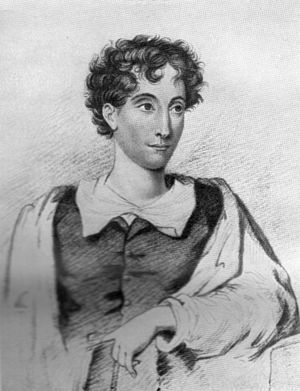Charles Maturin facts for kids
Quick facts for kids
Charles Maturin
|
|
|---|---|

1819 engraving
|
|
| Born | 25 September 1780 |
| Died | 30 October 1824 (aged 44) Dublin
|
| Nationality | Irish |
| Occupation | Clergyman, writer |
| Children | Edward Maturin |
Charles Robert Maturin, also known as C. R. Maturin (born September 25, 1780 – died October 30, 1824), was an Irish Protestant clergyman and a writer. He is famous for his Gothic plays and novels. His most well-known book is Melmoth the Wanderer.
Contents
Early Life in Dublin
Charles Robert Maturin came from a family of Huguenots. These were French Protestants who found safety in Ireland. One of his ancestors, Gabriel Jacques Maturin, became the head of St Patrick's Cathedral in Dublin. This happened after Jonathan Swift in 1745.
Charles was born in Dublin and went to Trinity College. In 1803, he became a curate (a type of church leader) in Loughrea. Soon after, he moved back to Dublin. He became a curate at St Peter's Church. He lived with his parents and married Henrietta Kingsbury, a famous singer, in 1804.
His Writing Career
Charles Maturin wrote many books and plays. He started by writing Gothic novels. These are often scary stories with old castles and mysteries.
Early Novels and Plays
His first three novels were published using a fake name, Dennis Jasper Murphy. They were not very successful. However, they caught the eye of famous writers like Sir Walter Scott and Lord Byron. With their help, Maturin's play Bertram was put on stage in 1816. It was very popular and ran for 22 nights.
Even though the play was a hit, Charles Maturin did not make much money. His father lost his job, and another relative went bankrupt. Charles tried to help them. Also, another writer, Samuel Taylor Coleridge, criticized his play.
Challenges and Later Works
The Church of Ireland found out that Charles Maturin wrote Bertram. Because of the criticisms, they stopped him from getting promoted in the church. He had to support his wife and four children by writing. His church salary was small, but he earned a lot more from Bertram.
After some of his other plays failed, he went back to writing novels. He wrote several books, including Melmoth the Wanderer. This book became his most famous work. He also wrote The Albigenses, a historical novel that included stories about werewolves.
Charles Maturin was also known for his powerful sermons. People would crowd into St Peter's Church to hear him speak. He died in Dublin on October 30, 1824. People remembered him as a very interesting person. He loved reading novels, was a good preacher, and enjoyed dancing.
Becoming Famous Worldwide
Charles Maturin's work became popular in other countries too.
French Adaptations
In 1821, his play Bertram was made into a French play called Bertram, ou le Pirate. It was very successful in Paris. This French version then inspired a famous opera called Il pirata (The Pirate). The opera first played in Italy in 1827.
Famous French writers like Victor Hugo and Alexandre Dumas admired Bertram. Dumas even based one of his own plays on Maturin's hero. Bertram was also printed and performed often in the United States.
Influence on Other Writers
His novel Melmoth the Wanderer was also translated into French in 1821. It became a very important book for French writers. In 1835, Honoré de Balzac wrote a story that made fun of Melmoth. Balzac said that Maturin's novel was as important as Faust and Lord Byron's Manfred. Charles Baudelaire also loved Melmoth the Wanderer. He thought it was as great as the poems of Byron and Edgar Allan Poe.
Family Connections
Charles Maturin had interesting family connections.
Oscar Wilde's Great-Uncle
His wife's sister married Charles Elgee. Their daughter, Jane Francesca, became the mother of the famous writer Oscar Wilde. This means Charles Maturin was Oscar Wilde's great-uncle by marriage. Oscar Wilde even used the name "Melmoth" (from Maturin's novel) during his time living in France.
Sons and Grandsons
Charles Maturin's oldest son, William Basil Kingsbury Maturin, also became a church leader. Several of his grandsons followed this path too. One grandson, Basil W. Maturin, sadly died when the ship RMS Lusitania sank in 1915. His second son, Edward Maturin, moved to the United States and became a novelist and poet there.
Another relative, William Maturin (1803–1887), was a priest and librarian in Dublin.
Known Works
Novels
- The Fatal Revenge; or, the Family of Montorio (1807)
- The Wild Irish Boy (1808)
- The Milesian Chief (1812)
- Women; or, Pour et Contre; a Tale (1818)
- Melmoth the Wanderer (1820)
- The Albigenses (1824)
Short Stories
- Leixlip Castle (1825)
Plays
- Bertram; or The Castle of St. Aldobrand (1816)
- Manuel (1817)
- Fredolfo (1819)
- Osmyn the Renegade (fragments published after his death in 1830)
Sermons
- Sermons (1819)
- Five Sermons on the Errors of the Roman Catholic Church (1824)
See also
 In Spanish: Charles Maturin para niños
In Spanish: Charles Maturin para niños
 | John T. Biggers |
 | Thomas Blackshear |
 | Mark Bradford |
 | Beverly Buchanan |

